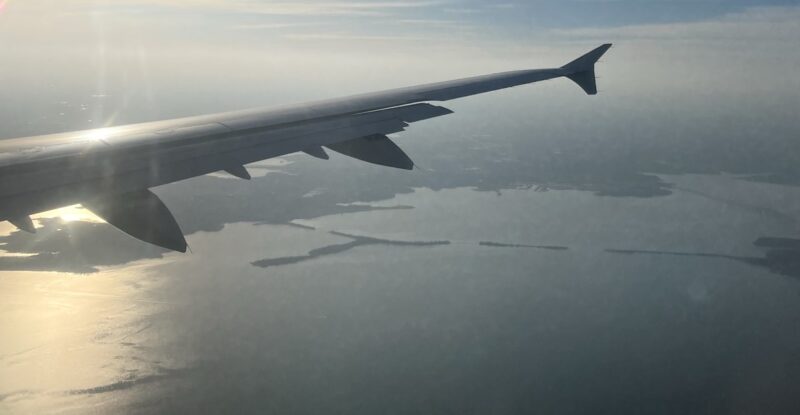 More than 100 countries have agreed through the International Civil Aviation Organization (ICAO) to pursue an aspirational goal to reduce the global airline industry’s carbon emissions by 5% by 2030 through the use of greener fuels.
More than 100 countries have agreed through the International Civil Aviation Organization (ICAO) to pursue an aspirational goal to reduce the global airline industry’s carbon emissions by 5% by 2030 through the use of greener fuels.
The non-binding target was set late last month during the Third ICAO Conference of Aviation and Alternative Fuels (CAAF/3) in Dubai, ahead of the ongoing COP28 climate change summit.
The agreement calls for the adoption of a new global framework to increase production of sustainable aviation fuels (SAF), lower carbon aviation fuels (LCAF) — which ICAO defines as fossil-based fuels with a 10% reduction in lifecycle emissions compared to conventional kerosene — and other cleaner energies such as hydrogen. The framework calls for improved access to financing to ensure that “no country is left behind” in the energy transition process, says ICAO.
Recognizing that some countries will have more capacity than others to scale up nascent alternative fuel technologies, member states will be able to “contribute to the vision within their own national timeframes” without having specific emissions-reduction obligations assigned to them.
“The role of the framework is to facilitate the scale-up of the development and deployment of SAF, LCAF and other aviation cleaner energies on a global basis, and mainly by providing greater clarity, consistency and predictability to all stakeholders, including those beyond the aviation sector,” says ICAO Council president Salvatore Sciacchitano.
Industry trade associations have welcomed the agreement, which Airports Council International (ACI) World director general Luis Felipe de Oliveira says will be “crucial” to delivering ICAO’s long-term aspirational goal of net zero carbon emissions from international aviation by 2050. This goal was reached at the 41st ICAO Assembly in October 2022.
International Air Transport Association (IATA) director general Willie Walsh describes the 2030 timeline of ICAO’s latest aspirational goal as “ambitious”, and calls on governments around the world to “urgently put the strongest possible policies in place to unlock the full potential of a global SAF market with an exponential increase in production”.
IATA envisions that SAF could potentially account for 65% of the abatement needed for the aviation industry to achieve its net zero target by 2050. However, the trade body emphasizes that airlines’ demand for SAF “vastly exceeds” supply, which it says accounted for just 0.2% of airlines’ jet fuel consumption in 2023.
Environmental campaigners are skeptical about the airline industry’s efforts to decarbonize while the number of flights continues to increase, accusing the sector of greenwashing. True emissions reductions, they argue, can only be achieved by flying less.
UK-based climate change charity Possible recently announced that it has filed formal complaints through the Organisation for Economic Co-operation and Development (OECD) against British Airways and Virgin Atlantic, alleging that the two carriers have made “misleading claims” about their emissions reductions.
“British Airways claims to be ‘driving urgent action towards net-zero emissions’ and said they have a ‘clear roadmap to achieving net-zero carbon emissions by 2050’. But our analysis found that BA’s emissions from jet fuel have increased year-on-year between 2016 and 2019,” says Possible. “Similarly, Virgin Atlantic has a ‘Mission to Net Zero’ plan that features prominently on its website and in its 2022 annual report, and fails to mention the airline previously falling short of its emissions targets. We believe this is crucial information for consumers to know.”
Responding to Possible’s action, a Virgin Atlantic spokesperson says: “[W]e are committed to achieving net zero by 2050 and have set interim targets on our pathway to get there. We already operate one of the youngest and most efficient fleets across the Atlantic and are targeting a blend of 10% SAF by 2030, which is capable of delivering lifecycle carbon reductions of more than 70% compared to fossil-derived jet fuel.”
A British Airways spokesperson says the carrier is “committed to transparency, integrity and responsible business practices”, adding: “We know that flying comes at an environmental cost and acknowledge the need for urgent action to tackle the impact flying currently has on our planet. In 2019, we committed to net zero emissions by 2050, and while there is no single solution to this challenge, as part of our BA Better World program, we have a clear roadmap of initiatives to get there.”
Airlines and other fossil fuel-dependent industries are coming under increasing pressure over perceived greenwashing. Taking aim at the oil and gas sector during the COP28 summit earlier this week, United Nations secretary general Antonio Guterres emphasized that “there must be no room for greenwashing”.
Related Articles:
- EASA to assess the affects of climate change on air travel
- Initial research findings suggest positive impact of SAF on contrails
- Eurocontrol pours cold water on decarbonizing long-haul flights
- EasyJet commits to buying carbon removal credits
- UK’s climate advisor blasts strategy to cut aviation emissions
- Carrot vs stick: Which policy will help SAF market fly higher?
- KLM doubles sustainable fuel surcharge to cover cost of more SAF
Featured image credited to











